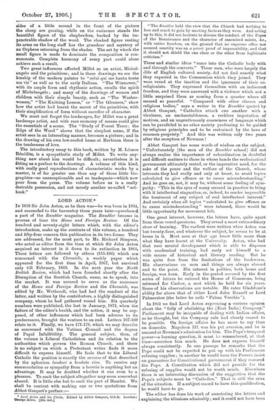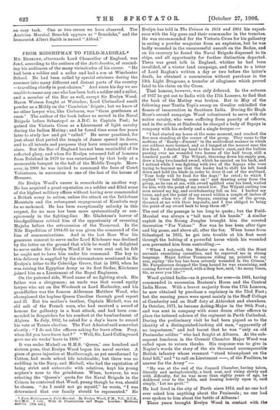LORD ACTON.*
IN 1858 Sir John Acton, as he then was—he was born in 1834, and succeeded to the baronetcy three years later—purchased a part of the Rambler magazine. The Rambler became in process of time the Home and Foreign Review. Of the hundred and seventy-eight letters which, with the editor's introduction, make up the contents of this volume, a hundred and fifty-four concern this publication in its two forms. They are addressed, for the most part, to Mr. Richard Simpson, who acted as editor from the time at which Sir John Acton acquired an' interest in it down to its extinction in 1864. These letters are followed by others (155-166) which are concerned with the Chronicle, a weekly paper which appeared for the first time in April, 1867, but survived only till February, 1868. In the next year the North British Review, which had been founded shortly after the Disruption of the Scottish Church, came, so to speak, into the market. It was secured to serve as the successor of the Home and Foreign Review and the Chronicle, was edited by 'Mr. Wetherell, who had had the conduct of the latter, and written by the contributors, a highly distinguished company, whom he had 'gathered round him. Six quarterly numbers were published, the last in January, 1871, when the failure of the editor's health, and the action, it may be sup- posed, of other influences which had been adverse to its predecessors, brought the venture to an end. Letters 167-169 relate to it. Finally, we have 171-178, which we may describe as concerned with the Vatican Council and the dogma of Papal Infallibility. The general subject, then, of the volume is Liberal Catholicism and its relation to the authorities which govern the Roman Church, and there is no subject 'on which a Protestant writer finds it more difficult to express himself. He feels that to the Liberal Catholic the position is exactly the reverse of that described by the aphorism laudari a laudato viro. To receive any commendation or sympathy from a heretic is anything but an advantage. It may be doubted whether it can even be a pleasure.' To omit the subject altogether may seem somewhat absurd. It is little else but to omit the part of Hamlet. We shall be content with making one or two quotations from Abbot Gasquet's preface :— • Lord Acton and his Circle. Edited by Abbot Gannet, O.S.B. London George Allen. UAL net.] "The Rambler held the view that the Church had nothing to lose and much to gain by meeting facts as they were. And acting up to this, it did not hesitate to discuss the conduct of the Popes of the Renaissance and the character of canonised saints, &e., with entire freedom, on the ground that no supreme office nor assured sanctity was an a priori proof of impeccability, and that it should not shield the one class or the other from legitimate criticism."
These and similar ideas "came into the Catholic body with and through the converts." These men, who were largely the elite of English cultured society, did not find exactly what they expected in the Communion which they joined. They were vexed at the inaction and the ignorance of their co- religionists. They expressed themselves with an indiscreet freedom, and they were answered with a violence which not a little surprised them as coming from a quarter where all seemed so peaceful. " Compared with other classes and religious bodies," says a writer in the Rambler quoted by Abbot Gasquet, " Catholics attack one another with a virulence, an uncharitableness, a reckless imputation of motives, and an ungentlemanly coarseness of language which can be paralleled in no other society professing to be guided by religious principles and to be restrained by the laws of common propriety." And this was written only two years after the reception of Newman !
Abbot Gasquet has some words of wisdom on the subject. "Unfortunately [the men of the Rambler school] did not always realise the importance of subordination in doubtful and difficult matters to those in whose hands the ecclesiastical government ultimately rested, or the imperative need, for the sake of the peace and the welfare of the Church, whose interests they had really and only at heart, to avoid topics calculated to give offence or to cause misunderstanding." And he goes on, not, it may be, without some feeling of sym- pathy: "This in the eyes of many seemed in practice to bring with it intellectual stagnation, or, indeed, to render impossible the treatment of any subject of real intellectual interest." And certainly when all topics " calculated to give offence or to cause misunderstanding " were tabooed, there would be little opportunity for movement left.
One great interest, however, the letters have, quite apart from these vexed questions. They reveal a most extraordinary store of learning. The earliest were written when Acton was but twenty-four, and whatever the subject, he seems to be at home in it. Most men at that age know little more than what they have learnt at the University. Acton, who had that rare mental development which is able to dispense with academical training, had early set himself to a wide course of historical and literary reading. But he was quite free from the limitations of the bookworm. His observations on men and things are always shrewd and to the point. His interest in politics, both home and foreign, was keen. Early in the period covered by the first series of letters he entered the House of Commons, being returned for Carlow, a seat which he held for six years. Some of his observations are notable. He rates Gladstone's ability far above that of either Lord John Russell or Lord Palmerston (the latter he calls "Palma Vecchio ").
In 1861 we find Lord Acton expressing a curious opinion about the "folly of abolishing the [East India] Company." Parliament may be incapable of dealing with Indian affairs, as he thought, but the Company rule had clearly ceased to be possible. On foreign affairs he has more to say than on domestic. Napoleon III. was his pet aversion, and he is amazed at Newman's admiration for him. The Pope's tem poral power—a burning question, it must 1)3 remembered, at that time—exercises him much. He does not express himself always consistently. In one passage he remarks that the Pope could not be expected to put up with his Parliament refusing supplies ; in another he would have the Powers insist on guarantees for Constitutional government if they restored the Pope. A Constitution which did not provide for the refusing of supplies would not be worth much. Elsewhere there is an interesting discussion of the suggestion that the. Pope's subjects must be "Catholics." That is still the crux of the situation. If a subject ceased to have this qualification, he would have to go.
The editor has done his work of annotating the letters and explaining the hllusions admirably; and it could not have been an easy task. One or two errors we have observed. The Austrian Marshal Benedek appears as " Benedake," and the lumourist Albert Smith is named "Alfred."















































 Previous page
Previous page